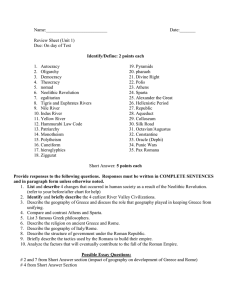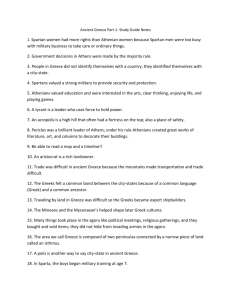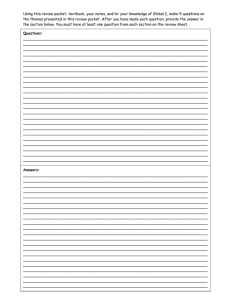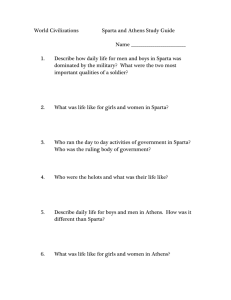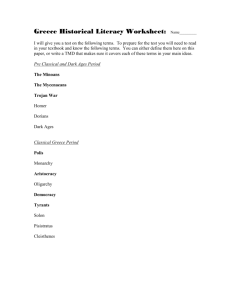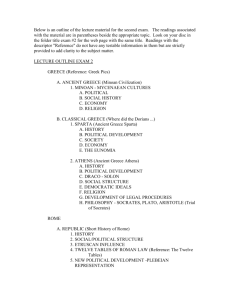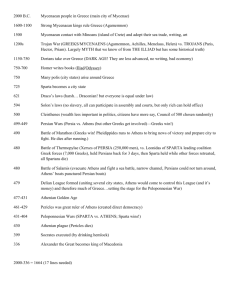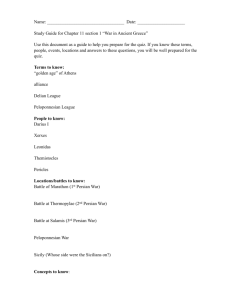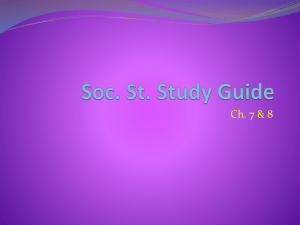Ancient Greece and Rome Notes
advertisement
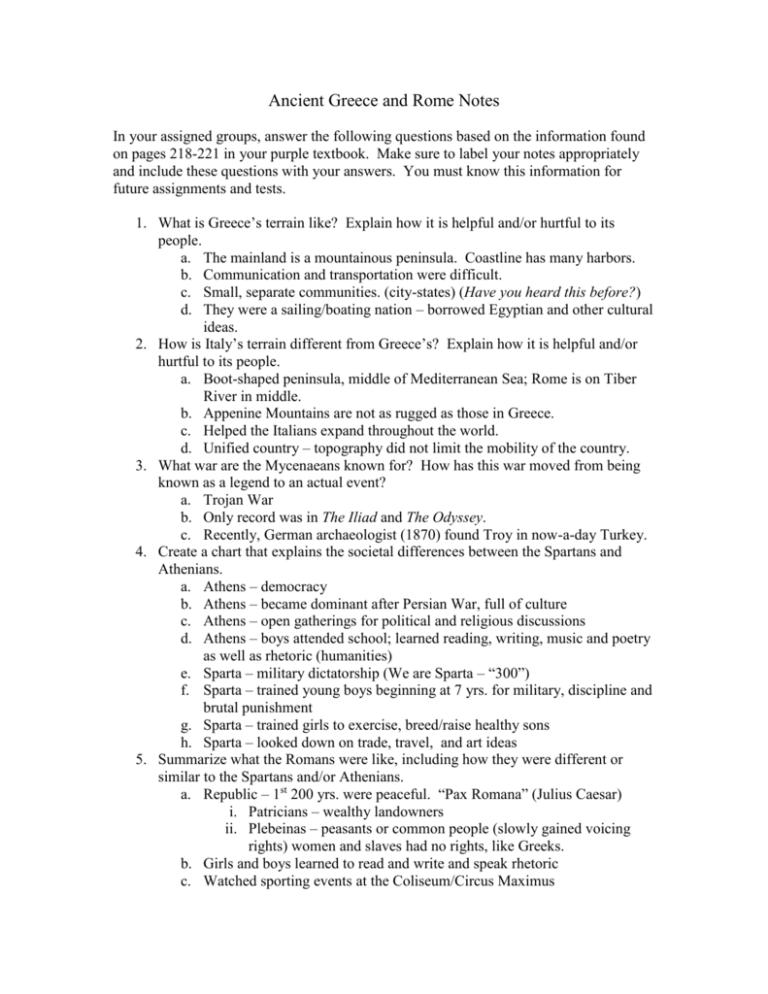
Ancient Greece and Rome Notes In your assigned groups, answer the following questions based on the information found on pages 218-221 in your purple textbook. Make sure to label your notes appropriately and include these questions with your answers. You must know this information for future assignments and tests. 1. What is Greece’s terrain like? Explain how it is helpful and/or hurtful to its people. a. The mainland is a mountainous peninsula. Coastline has many harbors. b. Communication and transportation were difficult. c. Small, separate communities. (city-states) (Have you heard this before?) d. They were a sailing/boating nation – borrowed Egyptian and other cultural ideas. 2. How is Italy’s terrain different from Greece’s? Explain how it is helpful and/or hurtful to its people. a. Boot-shaped peninsula, middle of Mediterranean Sea; Rome is on Tiber River in middle. b. Appenine Mountains are not as rugged as those in Greece. c. Helped the Italians expand throughout the world. d. Unified country – topography did not limit the mobility of the country. 3. What war are the Mycenaeans known for? How has this war moved from being known as a legend to an actual event? a. Trojan War b. Only record was in The Iliad and The Odyssey. c. Recently, German archaeologist (1870) found Troy in now-a-day Turkey. 4. Create a chart that explains the societal differences between the Spartans and Athenians. a. Athens – democracy b. Athens – became dominant after Persian War, full of culture c. Athens – open gatherings for political and religious discussions d. Athens – boys attended school; learned reading, writing, music and poetry as well as rhetoric (humanities) e. Sparta – military dictatorship (We are Sparta – “300”) f. Sparta – trained young boys beginning at 7 yrs. for military, discipline and brutal punishment g. Sparta – trained girls to exercise, breed/raise healthy sons h. Sparta – looked down on trade, travel, and art ideas 5. Summarize what the Romans were like, including how they were different or similar to the Spartans and/or Athenians. a. Republic – 1st 200 yrs. were peaceful. “Pax Romana” (Julius Caesar) i. Patricians – wealthy landowners ii. Plebeinas – peasants or common people (slowly gained voicing rights) women and slaves had no rights, like Greeks. b. Girls and boys learned to read and write and speak rhetoric c. Watched sporting events at the Coliseum/Circus Maximus 6. 7. 8. 9. d. Policy of “bread and circuses” – control of mobs (free grain to poor) e. Rule of law – all are equal before the law, innocent until proven guilty, fair trials, evidence f. Conquered many lands (including Middle East) – Prosecution of Jesus led to ultimate spread of Christianity. Based on your answers to questions four and five, in what ways did Greco-Roman tradition influence western culture? a. We have democracy today. b. We have military power throughout our own country. c. We have much of the Romance language in our own. (chronological, the planets’ names, etc.) d. We have Christianity because of Roman Conquests. e. We study the humanities in our primary, secondary and post-secondary educations. f. The Bill of Rights promotes open assembly b/c of GR influence. g. Justice is a big part of today – rule of law. h. Sporting events at large “coliseums” is huge part of culture. Describe what the Greek theater was like. a. Began in religious festivals, in outdoor arenas with little or no scenery b. Actors in elaborate costumes and stylized masks. c. Chorus was narrative voice d. Comedy v. Tragedy What did Greek literature begin with, lead to (added) and what did the Greeks and Romans pioneer? a. Homer’s epics b. Many other writers wrote epics to follow. Virgil, Dante, Milton, and more c. Pioneered the writing of history. How has ancient Greece and Rome continued to make its way into our current society? a. We have many of the same thoughts – study of humanities, power in education, military, etc. b. Form of government is similar to that of Ancient Rome and Greece c. We still have wars – our Civil war, World Wars I & II, Fight over political/religious views d. Rule of law has made it into our justice system – no more eye for an eye, but e. Language infiltration f. Sports influence g. Theatre and the arts influence h. Christianity spread i. Literature influence


